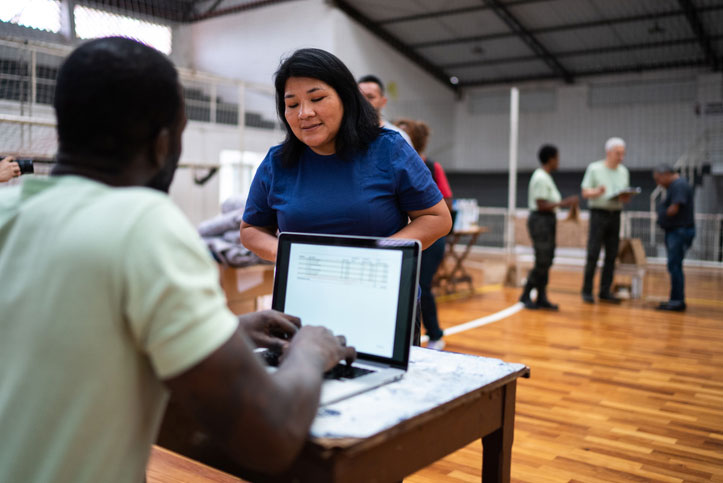Written by Scott Wilson

You won’t get too far into your social work education before you realize that it never really stops.
Whether you are just finishing up a Bachelor of Social Work (BSW) and heading off to an Advanced Standing Master of Social Work (MSW) program, or if you are making a career switch from another field by earning a traditional two-year MSW, the issues you engage with in New York’s human services sector are always shifting.
New research and social pressures change the landscape quickly…
- In the wake of 9/11, social workers in every borough were overwhelmed with grief and trauma counseling.
- During the global financial crisis, as Wall Street was getting big bailouts and ordinary folks were suffering, social workers turned their attention to combating wealth inequality and advocating for better consumer protections.
- When the COVID-19 pandemic turned the entire state on its head, social workers stepped in to address the fallout of job loss in the service sector and new challenges in healthcare counseling created by an infectious disease like no other.
If you didn’t see all that first hand, you will be learning about it from people who were there. And you’ll also learn that over their course of their careers, they had training to help them shift with the times. In many cases, that training came through short, focused certificate programs in social work.
New York Social Work Certificate Programs Explained

In a nutshell, a certificate is a short course of study that delivers focused information and skills in a very specific area. Although the courses are college-grade, they aren’t as broad as a degree.
While in other fields, a college certificate can serve as a qualification for licensure, for New York social workers, a Master of Social Work (MSW) is the only acceptable option.
The first thing you’ll notice when you start looking for social worker certificate programs is that you won’t find anything with exactly that name in New York. That’s because certificates for social work here come in dozens of much more specific subjects:
- Post-master’s Bilingual School Social Work Certificate
- Trauma Informed Clinical Practice Certificate
- Postgraduate Certificate in Environmental Justice
- Child and Family Therapy Certificate
- Organizational Leadership in Social Work Certificate
- Veterinary Social Work Certificate
- Post-graduate Certificate in Crisis Counseling
- Post-master’s Certificate in Healthcare Social Work
- Postgraduate Certificate Program in Addictions
- Advanced Certificate in Forensic Social Work
The scope of study is so broad that there are many certificates for social workers that really aren’t focused on social work at all. Almost any kind of behavioral health certificate program can be useful in the world of clinical social work, from CBT (Cognitive Behavioral Therapy) to animal assisted social work certificates. And there’s a reason for that. Certificates in social work are post-degree credentials for folks who already hold bachelor’s and master’s degrees in social work. So certificates aren’t so much about learning social work as they are about learning focused skills relevant to specialized areas of social work.
A certificate course in social work is a way of getting college-level coursework without going back to earn a full college degree.
Certificates can typically be completed in only a semester or two, and at far lower cost than a full degree. In fact, some colleges offer discounts to alumni who come back to earn certificates later on.
The Two Types of Social Work Certificates Available Build on Either a BSW or MSW

Almost all of these programs fall into one of two categories, depending on the degree that in-coming students hold, and naturally, on the difficulty level of coursework they contain:
- Post-master’s, or post-graduate, social work certificates hit that substantial population of MSW graduates who are looking to build on their advanced expertise with strategic new areas of study.
- Post-bachelor’s, or graduate, certificate in social work programs are available for BSW graduates looking to further develop their specialization in certain areas of practice. They do not count toward licensure in New York, but at some universities, graduate certificate credits may later be applied to MSW studies at the same school.
Getting Straight on the Differences Between Social Work Certificates and Social Work Certification
Social work is one of those fields where you will have to sort out the important differences between certificates and certifications.
- Educational certificates, the kind we are talking about here, are slices right out of college degree programs. They are offered by universities, and provide information and build skills through standard courses. They’re much like a degree, just shorter and less expensive.
- Professional certification can involve education, but it’s more about demonstrating ability than providing training. A social work certification is offered by an independent third party, namely the National Association for Social Workers. It assesses your skill and expertise in a specific social work role through evaluation and testing.
Certification is something that potential employers or clients can look at for a quick assurance that you have achieved a certain level of expertise. With a combination of requirements including testing, experience, and educational attainment, it sets a high standard. Certificates can play an important part in achieving that standard, but they aren’t the same thing.
Certificate programs typically offer approved continuing education credits, so they can be an important part of maintaining your LCSW or LMSW license in New York.
While in some fields, a certificate can be closely aligned with various professional credentials, in social work, certificates are less formal. In fact, in many cases they are blurred together with other continuing ed courses. Certificates may be longer and have multiple courses, but the topics they cover are often similar to stand-alone courses. You may be able to string together various continuing ed courses for a very similar kind of training to a certificate.
Social Work Certificates in New York Cover All Kinds of Clinical and Social Justice Subjects

Certificates are often a way for social workers to catch up on specialized training they didn’t take while earning their degree, or to broaden their expertise into new developments or new fields.
So there are just as many kinds of coursework in certificate programs as there are different fields of practice. Medical social work certificates, a certificate in social work and community development, clinical social work certificates, and forensic social work certificates all rub shoulders in New York schools. Each has their own unique coursework and objectives.
One thing they have in common is that they are typically put together out of the same college classes that are taught in degree programs. So you’re getting a slice of expertise equivalent to what you would experience if you’d taken the same program with your degree.
Social Work Certificate Programs Online Are Readily Available Through New York Universities
Earning social work certificates online is fast becoming the standard in our online world. It’s easy to see why:
- Online social work certificates are accessible from anywhere, at any time, meaning you don’t have to set aside your normal work and family obligations to earn one.
- Online social work certificate programs keep costs down by removing the need for commuting.
- Earning a social worker certificate online also opens up your choices for different schools and different specialties that might not be available in your own neck of the woods.
Because they don’t involve the sort of experiential placements that a full social work degree comes with, it’s possible to find social worker online certificates that are truly 100 percent remote. You may never have to step foot on campus to complete your studies.
Careers In New York that a Certificate in Social Work Can Prepare You For

No social worker training certificate by itself will get you a job anywhere in New York; degrees and licensure are the coins of the realm for paying positions.
But certificates in social work specializations can make a big difference in what types of social work jobs you are qualified for. That’s particularly true if you didn’t specialize in an area of practice that you later decide to pursue as a career. There’s a great deal of field-specific information in, say, criminal justice social work. You’re not likely to get a ticket to Rikers to help inmates there sort through the challenges of rehabilitation and reintegration with your geriatric MSW concentration.
But a forensic social worker certificate can build on your general skills and give you the right resume for the job.
Social work certificates also can play a key piece in keeping your job as a licensed New York social worker. As part of the 36 hours of continuing education you’ll have to clock in every three years for as long as you maintain your clinical social work license, certs both fill legal requirements and keep you current in a dynamic field. Like other ways that you build your qualifications for social work jobs, certificates may also have an impact on your salary potential.
As society changes, so does the need for knowledge and skills for social workers. To stay at the top of your game and make a difference in your community, certificates in social work are likely to be in your future.
